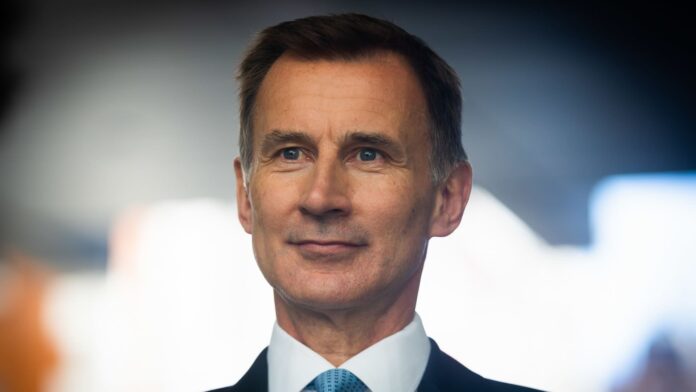Jeremy Hunt is interviewed for Sophie Raworth’s ‘Sunday Morning’ at BBC Broadcasting House in London.
Tejas Sandhu | Lightrocket | Getty Images
LONDON — U.K. Finance Minister Jeremy Hunt used his first Monday on the job to announce that almost all of the controversial tax measures announced by his predecessor would be reversed.
The major U-turn includes scrapping the cut in the lowest rate of income tax from 20% to 19%, as well as cuts to dividend tax rates, the reversal of off-payroll working reforms, VAT claim-backs for tourists and the freeze on alcohol duty rates.
Hunt said the reversed tax cuts totalled £32 billion a year.
Markets cheered the announcement, with sterling trading up over 1% against the dollar by 11:30 a.m. London time. Yields on U.K. government bonds also fell sharply, with the 10-year yield trading down 35 basis points at 3.974%. Yields move inversely to prices.
Hunt also announced that the energy package designed to subsidise consumer and business energy bills would only run until April and then be reviewed in order to “cost the taxpayer significantly less than planned.”
Under the current plan, the government is capping the amount paid per kilowatt hour for gas and electricity lower than the market rate amid soaring wholesale prices. The average household is now expected to pay £2,500 per year, still up from 2021’s average £1,400 annual bill but far lower than the £4,650 that had been predicted without intervention.
“A central responsibility for any government is to do what is necessary for economic stability,” Hunt said in a short statement statement around 11:15 a.m.
“No government can control markets, but every government can give certainty about the sustainability of public finances. That is one of the many factors that influence how markets behave. For that reason, although the prime minister and I are both committed to cutting corporation tax, on Friday she listened to concerns about the mini budget.”
Hunt said a full statement with questions would come in parliament later Monday, but because the details were market sensitive he wanted to give a brief summary in an effort to instil “confidence and stability.”
Market chaos
The government had already been forced to U-turn on both its plan to scrap the top rate of income tax and ditch a planned rise in corporation tax from 19% to 25%.
On Friday, Prime Minister Liz Truss fired her Finance Minister Kwasi Kwarteng less than six weeks after the pair took office, appearing to blame the chaos sparked in financial markets by the budget he announced on Sept 23.
It included unfunded tax cuts forecast to total £45 billion ($50.78 billion), which were billed by Truss and Kwarteng as a radical plan to turbocharge the U.K.’s sluggish economic growth and were a key part of Truss’s leadership campaign.
However, markets were spooked by a range of factors including the prospect of significantly higher government debt given the impending subsidies of consumer and business energy bills, and the perceived mismatch between the Bank of England’s current monetary tightening to tame inflation and the government’s stimulus package. The lack of economic forecast from the U.K.’s Office for Budget Responsibility also weighed on markets.
The pound’s year-long decline against the dollar accelerated and U.K. government bonds, known as gilts, saw a dramatic sell-off. The Bank of England launched a temporary bond-buying program to support the market, which ended Friday, in large part to protect liability driven investment (LDI) funds — many of which are owned by pension plans — from collapse.
Along with the potential effects of a weaker pound, the public has also been impacted by market volatility as mortgage offers were pulled and mortgage rates spiked as lenders assessed new rate hike expectations.
Sigh of relief?
The ruling Conservative Party will be hoping that the arrival of Hunt, who has held previous roles as health and foreign secretary but was a so-called “backbench” member of parliament until Friday, will give the government a much-needed boost in support.
Political polling shows the party plunging to lows not seen since the 1990s and Brits also a difficult winter of higher prices.
John Gieve, former deputy governor at the Bank of England, told the BBC Monday morning that leaks from the Treasury showed the U.K. deficit was nearing £70 billion.
“Hunt realised even if he squeezes public expenditure hard he won’t be able to square the books doing that,” he told the Today program.
“So he can’t afford the sort of tax cuts, even the £25 billion that remain on the table.”
Media reports have emerged of discontent with Truss’s premiership from her own MPs just 40 days since she took the job. However, under current Conservative party rules a fresh leadership election cannot be held for 12 months.
Former Prime Minister Boris Johnson announced that he would step down on July 7 after a wave of resignations by top ministers.


